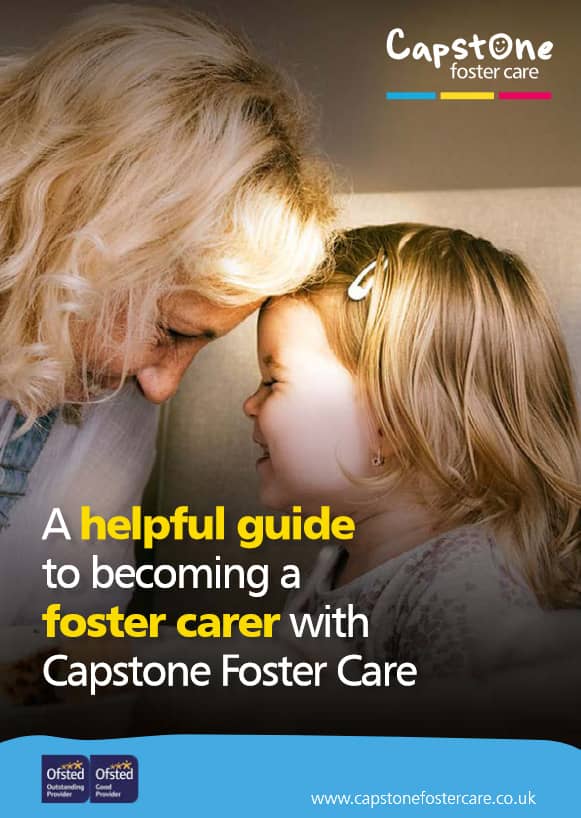


Fostering a disabled child
The role of an independent fostering agency
How to choose a foster care agency
Can I choose who I foster?
What are the benefits of fostering with an independent fostering agency?
What happens when a child is taken into care?
Fostering process: what happens on an initial home visit?
Fostering with local authority vs independent agency
A complete guide to becoming a foster carer
How Are Children in Foster Care Matched with Carers?
Foster Care Budgeting Tips
Becoming A Foster Carer
What is a Care Leaver?
What is a Foster Carer?
Fostering Regulations
How long does it take to become a Foster Carer?
What are the Foster Care requirements?
Changing IFA - Transferring to Capstone
8 reasons why a child may be taken into care
Fostering as a Career
Can you foster if you smoke or vape?
A guide to fostering assessments
LGBTQ+ Fostering
Equality, Inclusion & Anti-discriminatory Practice in Foster Care
What can disqualify you from foster care?
Can you foster if you’re on benefits?
Top transferable job skills to become a foster carer
Fostering as a same sex couple
Fostering while renting
Can you foster if you have mental health issues?
Is there an age limit for fostering in the UK?
Do foster carers get a pension?
How to foster a child: A step by step guide
How do DBS Checks Work?
Can I foster if...?
Mythbusting the top 10 Foster Care Myths
Can I foster if I am disabled?
LGBT Fostering Mythbusting
Can I foster if I have pets?
Can I Foster A Child?
Can I Foster and Work?
Can you Foster with a Criminal Record
Can Single People Foster?
LGBT Family and Foster Care
Fostering across Cultures
Muslim Fostering
Christian Foster Care
Sikh Fostering
Empty Nest Syndrome and Foster Care
Can I Foster?
What is the difference between residential care and foster care?
Fostering Babies and Young Children
What is Kinship Care?
Fostering Babies - Myths
Focusing on Parent & Child Fostering
Fostering Siblings
Fostering Teenagers
Fostering Teenagers - Breaking down the Myths
Fostering Unaccompanied and Asylum Seeking Children
Mother and Baby Foster Placements
Private Fostering
How does therapeutic fostering work?
Young Children Fostering Placements
Difference between short and long-term fostering
Types of self-harm
A Guide to the Foster Care Handbook
Reunification and Birth Parents: A Guide for Foster Carers
What is an EHC Plan? A Guide for Foster Carers
How to prepare a child for becoming a care leaver
Children who foster: impact of fostering on birth children
Fostering LGBTQ+ Youth
How to prepare your home for a foster child
How to help a lonely child: A Guide for Foster Carers
What are the National Minimum Standards for Fostering Services?
10 tips for foster children's education
How to prepare your foster child for secondary school
Tips for coping when foster placements end
Tips for foster parents during Coronavirus
What happens if foster parents get divorced?
5 ways to manage Mother's Day with foster children
Tips for managing foster children's bedtime routines
How to handle foster child bullying
Fostering allowances and the gender pay gap
What discounts can foster carers get?
How to adopt from Foster Care
5 ways to manage Father's Day for children in foster care
8 most common fostering challenges
FosterTalk Membership with Capstone Foster Care
Supporting foster children's contact with birth families
A guide to independent fostering
Keeping Children Safe Online: A Guide For Foster Carers
Movies About Foster Care
Play-based learning strategies for foster carers
A Guide to the Staying Put Program
Why Foster Parent Wellbeing Matters
How to deal with empty nest syndrome
How to recognise signs of depression in foster children
Can you take a foster child on holiday?
Tips and advice on fostering with a disability
10 tips on connecting with your Foster Child
Fostering vs Adoption - What's the difference?
How Fostering can change a future
How to adopt from Foster Care
How to encourage children to read in Foster Care
How to prepare a Foster Child's bedroom
Reading and Storytelling with Babies and Young Children
Supporting Children's Learning
The 20 most recommended books Foster Carers and young people should read
Things you can do when your children leave home
The impact of early childhood traumas on adolescence and adulthood
Anxious Disorders in Foster Children
What is sexual abuse and sexual violence
Foster Child behaviour management strategies
Foster Parent Advice: What to expect in your first year of fostering
Capstone's twelve tips at Christmas
10 celebrities who grew up in Foster Care
Could Millenials be the solution to the Foster Care crisis?
Do you work in Emergency Services?
Form F Assessor and Assessment Training
Foster Care Fortnight
Improving Children's Welfare - Celebrating Universal Children's Day
New Year - New Career - Become a Foster Carer
Young People Charities
These books provide advice and guidance of how to handle certain situations and give a realistic insight into what fostering is like for carers and children.
Why Can’t My Child Behave? Empathic Parenting Strategies that Work for Adoptive and Foster Families by Dr Amber Elliott
This is a very useful tool in understanding the concept of Therapeutic parenting, and why children may not be responding to particular behaviour management strategies.
In our Dartford office the social workers refer to this book often when foster carers are encountering difficulties with their children’s’ behaviour. It focuses on a therapeutic way of parenting children, and understanding how their past experiences have impacted on their behaviour, and strategies of how to support them.
The Foster Parenting Toolbox: A practical, hands-on approach to parenting children in Foster Care by Kim Phagan-Hansel
Each child will be unique and require a different set of tools in your toolbox. Over 100 foster parents in the trenches, case workers, social workers, and judges contributed to this book to help all those on the child’s team understand and work better with the children who are entrusted to their care. Covering topics from new-borns to teens and everything in between, this book will help not only foster parents, but be beneficial to those who work with foster parents: case workers, social workers, judges, and others.
The Simple Guide to Child Trauma (Simple Guides) by Betsy de Thierry
This book is really helpful as a starting point, particularly for brand new carers, on understanding how to support a child who has experienced trauma. It gives helpful advice around understanding how a child’s trauma has affected their behaviour with a therapeutic parenting type approach.
Raising Boys by Steve Biddulph
Below is what one of our foster carers Maggie, a single carer and parent of girls who is raising boys wrote: “As a mother of two grown up daughters, a grandmother to 5 girls and a very young grandson, I had hardly any knowledge of bringing up boys. When I got my first placement of two young male siblings one 2 years and his brother of 5 years I was struggling a little so I was leant a book by a member of staff in Capstone called Raising Boys.
It is a light hearted, easy to read book about raising boys and the different stages they go through, how their brains develop slowly and how their nervous system is wired up in a different sequence. It goes on to say at 4 years old, boys can be too young to start school and how they often resent school as it is to formal and involves too much sitting still. The book goes on through the stages and helps you understand your boys and what makes them unique, how to love them better and make sure they turn out to be well balanced young men. It is well worth a read!”
Nobody’s Child by Kate Adie
This is a truly compelling read for carers who themselves were adopted, may have a child whom they are to adopt or will prepare to be adopted. It is a good book about identity and life story and also useful for carers who may care for a child with little or no information about themselves. It serves to remind carers that even if they have no information about a child, always remember that a child will become an adult one day and will want to know about their history and journey.
Why Love matters – how affection shapes a baby’s brain by Sue Gerhardt
This is a really riveting read for all carers, regardless of caring for babies or older children as it enables you to understand how a mother’s selfcare and experiences during pregnancy impacts on the unborn child’s brain development and emotional regulation. Chapter 3 looks at the impact of stress on babies and children, including separation from their parents and carers. In addition, Chapter 9 – ‘Repairing the damage’ is a very useful section too, it gives an insight into how the work you can do as a carer and the interventions that are offered to children may/may not repair the damage suffered in their early months and years. However, there is a clear reminder that making a child feel loved and valued will go a very long way in their adulthood.
A Child’s Journey Through Placement UK Edition Vera Fahlberg MD BAAF Adoption and Fostering
This book is an excellent reference book and good read. It covers everything from attachment, bonding, child development, separation and loss, minimising the trauma of moves, behaviour problems and life story work. Carers would find the range of subject areas very helpful in gleaning information to aid their understanding and offers help to them caring for children in the care system.
There are very practical messages such as ‘the foster carers role when a child leaves your home’ for instance that illustrates behaviour of the child and what you can do in that process through case study type approach. You do not have to read this book from beginning to end, as the various sections are useful to you throughout your fostering carer. I would recommend that you read this book if you are thinking of fostering, is someone who is very early into your fostering carer, or if you need to develop your understanding on a range of key topics within fostering. The book provides a great link between case studies, theories and practical approaches in caring for children who are in foster care or who may move to prospective adopters.
Fifty-One Moves by Ben Ashcroft
This book by Ben Ashcroft is a heart rending account of abandonment, loneliness and rejection in his family life. Ben entered the care system aged 9 and faced such challenges as crime, drugs, absconding and being in custody. 10 years on he now motivates young people from similar backgrounds to believe that they can turn their lives around in the same manner that Ben has accomplished. This really is a good read and a fantastic insight into the life of a young person in care.
Therapeutic Adventures with Autistic Children by Jonas Torrance
Uplifting tales that show the positive and powerful impact creative therapy can have for children with autism. A great read for anyone who parents or supports another person’s social and emotional development. Each chapter in this heartening book is the story of a child with autism and how therapy was pivotal in confronting his or her individual dilemma.
Just Another Kid: Each was a child no one could reach – until one amazing teacher embraced them all by Torey Hayden
A beautiful illustration of nurturing concern, not only for a few emotionally disturbed children, but for one woman facing a personal battle.
How to Look After Yourself by Adams Media
A little book of self-care: 200 ways to refresh, restore and rejuvenate. This book features 100 accessible activities that help you reconnect with your body, mind, spirit, and surroundings, and leave you feeling refreshed and ready to face the world again.
The Colour of Us by Karen Katz
This is a child’s picture story book about diversity and the subject matter is very much in the title ‘our different skin colours’. It is a book that carers who care cross culturally in particular can read to a child, or maybe a child aged from 7 or 8 years old could read aloud with a carer. The book is written as if the story is been told by a girl, aged 7 named Lena and it describes skin colour in everyday food related and positive language that children should be aware of in their everyday surrounding.
Maybe Days: A Book for Children in Foster Care
Straightforward look at the issues of foster care, the questions that children ask, and the feelings that they confront.
Dennis and the Big Decisions
Explains to young children who are living in foster care about why they have moved from their family, why they may have future moves, and who will make these decisions
Little Meerkats Big Panic by Jane Evans
A story about learning new ways to feel calm
A Sky of Diamonds by Camille Gibbs
A story for children about loss, grief and hope
Striker, Slow Down by Emma Hughes
This charmingly-illustrated picture book for ages 3-6 aims to teach busy children about the benefits of taking time to sit quietly and clear their mind. Touching on the principles of mindfulness, it provides the perfect introduction to the differing feelings of chaos and calm and encourages children to find balance in their increasingly busy lives.
Who are You? By Brook Pessin-Whedbee
This brightly illustrated children’s book provides a straightforward introduction to gender for anyone aged 5+. It presents clear and direct language for understanding and talking about how we experience gender: our bodies, our expression and our identity.
Carlos the Chameleon: A Story to Help Empower Children to Be Themselves by Alice Reeves
Part of the Truth & Tails series, which aims to eliminate prejudices and encourage acceptance in young children aged 4-8.
All you need is love by Shanni Collins
Celebrating families of all shapes and sizes. The stories cover all types of modern (and post-modern) families and the ways in which our glorious LGBT community has given itself wholeheartedly to raising healthy, well-adjusted and diverse families. Recommended for younger readers and for anyone with children.
If you’ve got any questions or would like to find out more about fostering with Capstone, fill out the form below.
An experienced fostering advisor from your local area will then be in touch.

Start the conversation today. Our team of friendly advisors are on hand to answer any foster care questions you may have. We can offer you honest and practical advice that can help you decide if becoming a foster carer is the right path for you.


